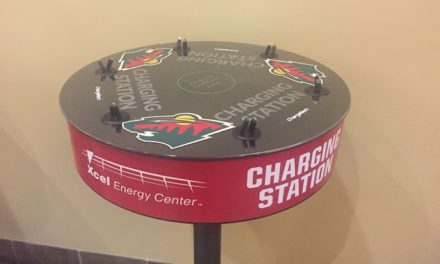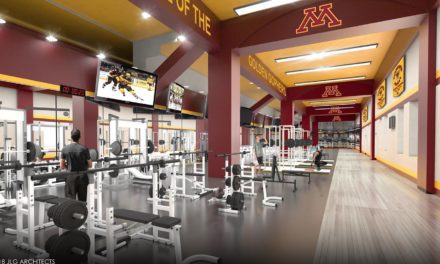It’s been a challenging run for the Western Collegiate Hockey Association in the four years since it lost two of its most prominent members to  the formation of the Big Ten conference and another four to the subsequently formed National Collegiate Hockey Association.
the formation of the Big Ten conference and another four to the subsequently formed National Collegiate Hockey Association.
But despite the challenges of fielding teams from the northwest corner of the country down to the southeast, the WCHA has slowly been rebuilding and retooling.
This last offseason, says WCHA Men’s Commissioner Bill Robertson, there was no talk of teams leaving the conference or shutting down programs for financial reasons. He had conversations he described as positive with Arizona State about eventually joining the WCHA. And, due to some belt tightening, the league turned a profit in 2016-17 for the first time since the 2013 upheaval.
Robertson acknowledges the league has significant challenges. It must continue finding ways to lessen travel burdens created by the large swath of country it covers. And on the ice, its members have to find a way to improve a dismal non-conference record that resulted in just one of its 20-plus-win teams from making the NCAA Tournament.
But stability off the ice, Robertson says, can only help performance on the ice. And Robertson is of the belief there are better days ahead. He sat down with the MN Sports Biz Blog to share his thoughts on the WCHA’s recent past and his hopes for better years ahead.
MNSBB: What’s new with the WCHA in 2017-18?
Robertson: One of the things right now is there is stability in the WCHA. There used to be more flux with potential teams coming and going. I think we’re at a state right ow where we’ve stabilized the business, stabilized the 10 institutions on the men’s side. The goal is to get two to three teams in the NCAA tournament. We have that ability.
MNSBB: Expand on that – you had four teams win 20 games last year, but only one made the tournament. The winning percentage outside the conference was 28 percent. How do you make that jump?
Robertson: Part of it is having more of a focus with our coaches on winning non-conference games. That’s critical to the success of the league. I have talked to all of the coaches either individually or in Florida about the emphasis that our league needs to place on winning outside the WCHA. Teams are going to play each other, 28 league games overall, and that’s a lot. The success of our league will be dependent on how we do in the non-conference. That’s going to determine how many teams make it to the NCAA tournament.
MNSBB: So. you’re convinced it’s not a talent differential? It’s easy to say we have to win non-conference games, but that has to translate to the ice?
Robertson: We had a couple of our teams that lost maybe two more games than they should have and that was the difference in us having two or three teams in the tournament. If we can get to a .500 record in the non-conference, we’ll be in a much better place.
MNSBB: Is your sense that the teams have the players they need to be competitive?
Robertson: Yes. The great thing about men’s college hockey is that teams can compete with anybody. There isn’t that big of a difference between the conferences when it comes down to it. The past few years, in the NCAA tournament, teams like Providence and Union have won the national championship, and they are smaller institutions as far as enrollment and wouldn’t be names that you would think of as household hockey names. But they’ve had great success. So, if they can do it, why can’t teams in the WCHA?
MNSBB: A year ago, there was talk of University of Minnesota – Mankato leaving the conference. This offseason you were in discussions about the possibility of adding Arizona State. The current conference membership is stable?
 Robertson: We had the issues a year ago with the Alaska schools potentially having to drop their programs, but that seems to have stabilized and both are going to continue forward. That is a good thing for our league. We need to focus as the WCHA on our 10 existing institutions and work toward them getting better. We need them to succeed on the ice. We need their enrollments at the schools to be in a good spot and for our coaches to go out and recruit at the highest level they can.
Robertson: We had the issues a year ago with the Alaska schools potentially having to drop their programs, but that seems to have stabilized and both are going to continue forward. That is a good thing for our league. We need to focus as the WCHA on our 10 existing institutions and work toward them getting better. We need them to succeed on the ice. We need their enrollments at the schools to be in a good spot and for our coaches to go out and recruit at the highest level they can.
MNSBB: Does the stability you are talking about help translate the results you need to the ice?
Robertson: I think it helps when there is not a lot of flux in what could happen. College hockey has certainly changed the last few years. Obviously with the formation of two new leagues, the Big Ten and the NCHC, college hockey took quite a turn.
I think it has stabilized some and our conference has stabilized. We had a year (2016-17 season) where, since I took over, this is the first year we are in the black. We have changed a lot of the business structure for the league. We have reduced many expenses and we have tried to be really good and on target with the potential for new partners and sponsors.
MNSBB: Can you give me any specifics on reduction of expenses or news on sponsors?
Robertson: When I came to this job, we condensed our offices and moved everything to a central location here in the Twin Cities. I think that’s a good thing where all of our staff members are in one place.
Then we took a look at what expenses we had and what we can live with and what we can’t. We did a scrub down on every line item of our budget and got to a point where we were comfortable with what we could work with. I feel good about where we are at with that.
In saying that, the model we have turned into our on-campus tournament format has helped intrigue a lot of potential partners on wanting to jump on board with the WCHA. They see the investment, they see that the tournament is on campus, they saw the energy that took place at Michigan Tech this past year, arguably one of the top collegiate sporting events of the entire year in the NCAA, with a double-overtime victory by Michigan Tech over Bowling Green in front of an overflow capacity crowd at Michigan Tech.
That tells me a lot about the product and where it’s heading.
The subscriptions and the one-time buys jumped significantly last year during our playoff run. Our page views on our website, our Facebook, our Twitter and our Instagram are all at much higher levels than when we took over. That tells me there is a lot more interest in our league.
I don’t want to comment on partners, but I will say there has been a lot of interest. I’ve spent a lot of time this summer working on potential partners for the league and will continue to do that throughout the year.
Ticket sales were higher than anticipated in the playoffs this past year. That was a big factor in us doing well last year. We have much more work to do on this front. By no means are we satisfied with where we are at. But we are in a much better place.
MNSBB: How would you describe your discussions went with Arizona State with respect to the Sun Devils someday joining the WCHA?
Robertson: We determined working together in the month of June that they were going to continue to play a role as an independent until their arena is built. We said we’d like to continue talks with the Sun Devils once all that is established. We still have an open dialogue. I am still in communication with Arizona State. They were great to work with. It was a learning experience for us. I am always looking at opportunities to better ourselves and for the potential to add new institutions to our league.
But I will say this: The main focus for the league is the health and welfare of our 10 current WCHA institutions. That is the highest of priorities.
MNSBB: So, nobody ended the discussions angry?

Bill Robertson catches up on correspondence. By Andrew Tellijohn
Robertson: Nope, not at all. I still talk to them. And I send them NCAA information. I want to keep those doors open We have several schools playing Arizona State this year in the WCHA and we’re going to continue to do that.
MNSBB: It makes sense that the 10 existing teams are your priority, but would Arizona State make the WCHA a better conference?
Robertson: I‘ll put it to you this way. My goal coming into the WCHA is that over time we would look at adding new schools. I don’t have the exact timeframe for when that would or could happen. But I like the idea that we would maybe have 12 teams and two six-team divisions inside the WCHA.
MNSBB: Ok, what would that allow you to do?
Robertson: That would allow us, with a scheduling model that would help us minimize some of the travel. We have the broadest footprint in all of college hockey. That would help.
MNSBB: You do have teams from Alaska to Alabama. Adding a team in Arizona would widen that already large footprint.
Robertson: That is a broad footprint. That is the challenge. That’s why I say the health of our current 10 teams is our most important priority. But if we were able to add two teams over time – and that takes a lot of energy and effort to do – then we could maybe split up the league and have two different divisions where the travel wouldn’t be as potent.
MNSBB: What could that end up looking like?
Robertson: I don’t know. I’ve looked at all sorts of models and written things down over time and showed some of our institutions, but I think the one thing is we would need to split up the Alaska schools, have one in one division and one in the other. It wouldn’t necessarily be the western schools are the West and the eastern schools are the East because that wouldn’t be fair either.
MNSBB: A few years back you were proposing “The Big Idea” where three conference tournament finals would be packaged together in a single market, likely the Twin Cities. What’s the status on that?
Robertson: I’m not the only one who has come up with this, but I call it the Big Idea. I do believe the teams in the western part of the U.S. – that would include the Big Ten conference, the WCHA and the NCHC – all could have their championship games in one site to make it a celebration of college hockey in mid-March.
You could play your quarterfinals and semifinals at your own sites or however you want to do that. And then we would have a game at noon, a game at 4 and a game at 7:30, and you could have a fan come and get all three of those games in one sitting. That is a dream. I don’t know if that is going to happen, but I have talked to my fellow commissioners about the concept, at least the western people. And potentially over time that may be the route we end up wanting to go.
Right now, we’re in the second year of three years of a commitment to play on campus with our championship. We want to give it a few years to figure out all the nuances.
But yes, the Big Idea I would be all for at least exploring again.
MNSBB: It’s not currently on the table?
Robertson: The Big Ten is going to on-campus this year for the first time for their playoffs. Their Championship is not going to be in Detroit or St. Paul any more. They are following our league. Several conferences have contacted me about our model.
MNSBB: How did your on-campus conference tournament model come together? Was it attendance driven?
Robertson: There were a lot of factors. I would say it was driven by administrators, coaches and the league office. There were many reasons. We think the attendance could be better. We think the revenues could be better. And we also thought the student athlete experience would be much higher, greater. An electric atmosphere is what we are trying to get. One of our mottos is there is no place like home.
MNSBB: What are some of the best WCHA story lines on the ice this year?
Robertson: I would say this — every team is improved. I mean that sincerely. Huntsville is going to be better this year. Bowling Green is coming off a run into the championship game of our conference tournament. They are going to be better. The four Michigan schools – Lake State. Michigan Tech has a new coach. Northern Michigan has a new coach. That will all be interesting to watch. Ferris State is always a perennial power. The two Minnesota schools, Bemidji is going to be very good again and Minnesota State will be very good again. And both Alaska schools – Fairbanks has a new coach in Lance West and Anchorage has a new athletic director, so it will be interesting to watch.
What I would say is the preseason polls may be a lot different at the end of the year because of the balance in this league. This is a tremendously difficult league to compete in because teams are so tough at home. It is tough to win on the road it is really challenging to sweep a team on the road.
MNSBB: How do you think college hockey as a whole is doing right now given the changes that took place in 2013?
Robertson: I still think one of the things college hockey, particularly in the west, I’m hopeful that over time the identities of the schools and the conferences become more household names to people. I still believe fans struggle with knowing what teams are in what conferences with all the changes, particularly in the west. For the WCHA, the Big Ten and the NCHC, that is challenging. People have a tough time adapting to the change. Fans and media and sponsors too to some degree. They were used to what it was.
I came to the league after all that has happened. We’re looking forward, we’re not looking back. Everywhere I go to speak people ask me about the old WCHA and the new WCHA. I say we have new rivalries. That’s part of the charm. The Bemidji-Mankato rivalry is phenomenal. The two Alaska schools’ rivalry is phenomenal. When the four Michigan schools play each other it’s unique. And Bemidji has a rivalry going back to its Division II days with Huntsville.
MNSBB: Outside of Bemidji, a pretty long drive, is there a rivalry for a Huntsville?
Robertson: I’d say their rivalry with Bowling Green is a good one. I’d say the one thing is that our coaches are certainly competitive with each other. But they are all about what’s best for the league. And that is what makes it really exciting.
MNSBB: And your sense is that the financial situation with the Alaska schools has stabilized?
Robertson: Yes. We’ve been assured by both institutions that they are playing Division I hockey. We’ll monitor that situation as we go. All we know is they have given assurances that they are good to go. They are not folding up their tents. They are committed to playing Division I hockey.
MNSBB: For this season?
Robertson: And beyond. I believe they will be. I think a lot depends on the state of Alaska and what happens – things that are out of our control. My goal is to be in consistent and constant contact with both their athletic directors.
MNSBB: Is there anything you’d like to add?
Robertson: The new on-campus tournament was a rousing success. We have moved past last year’s hurdles with the two Alaska schools and Minnesota State being a proud member of the league and the Alaska schools moving forward with their status reaffirmed. Top to bottom, WCHA programs are continuing to improve on and off the ice. Three schools are on multi-year runs of winning 20-plus games: Minnesota State, Michigan Tech and Bowling Green.
Minnesota State and Bowling Green have made important improvements to their ice and arena facilities. Ferris State has been to a regional final in two of the last four years and last year Bemidji State had its best season this decade.
Northern Michigan had one of the best records in the WCHA in the second-half of last season, including a record-setting run in goal by Atte Tolvanen. And they added one of the top young coaching minds in Grant Potulny, who was at Minnesota, as their head coach
Alabama Huntsville has improved their winning percentage each year in the league. Lake Superior State produced a pair of NHL signings out of its talented group of underclassmen. And both of the Alaska schools have a solid foundation of growth.
We’re pleased with where we are at. We are really focused on the 10 teams, how to make them even stronger. How do we do that? We want to make travel more manageable. Our schedule is already unbalanced. We are continuing to explore new scheduling models with pods of teams to divisions that would help reduce the frequency of longer trips.
There is good, entertaining hockey in the WCHA. There is no question from the outset we need to improve our non-conference results to get more teams in the NCAA Tournament. But we continue to play a high caliber of hockey. We had a pair of All Americans last year. Michael Bitzer, the goaltender from Bemidji and Daniel Brickley from Minnesota State.
Seven players have signed NHL deals since the 2016-17 season ended and 35 players representing all 10 of our institutions were invited to NHL developmental camps this summer. That’s a credit to these great student athletes and their coaches. When you talk about talent, that’s a big deal.
We always talk about possible opportunities of strengthening our 10 institutions, including expansion. At the end of the day, if expansion is what is best for our 10 schools we will move forward. If not, we are just fine with the 10 we have. So, underneath that, I’d say the process with Arizona State was a very positive exercise in identifying areas where expansion makes sense and is a benefit and areas that also give us pause – the pause is the large footprint. We need to be careful and consider how it would affect travel, both for our member schools and the new member as well.
Both the WCHA and ASU agree now is not the right time to continue considering conference affiliation but we left the door open for future discussions should the situation merit. I have the utmost respect for their administration, their athletic director Ray Anderson, their head coach Greg Powers and the entire Sun Devils program.
We know that they’re playing several WCHA schools and they are hosting a tournament in Las Vegas’ new NHL arena that features Northern Michigan.
The last point, regarding the Alaska situation, we’re in a much better spot than we were a year ago at this time and we’ve been given reassurance for the foreseeable future. Given the continued budget difficulties in the state of Alaska, we’ll continue to monitor the situation. Both Alaska Anchorage and Alaska Fairbanks in my mind really contribute to the well-being of the WCHA and college hockey. College hockey is stronger having both Alaska schools playing Division I hockey and both schools are committed to being viable, competitive teams and I commend the leadership of both teams and their communities for rallying around hockey and wanting to keep Division I hockey.





Recent Comments